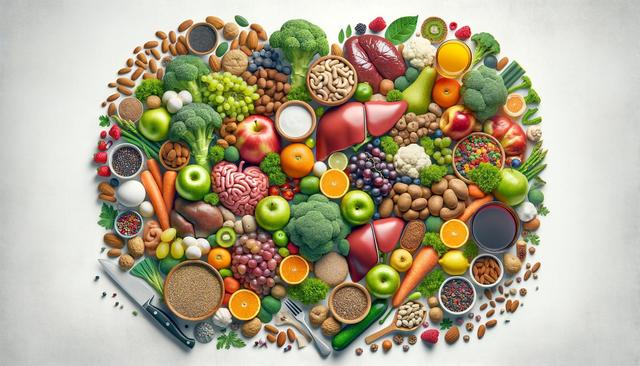A Guide to Foods That May Support Liver Health: What to Avoid
Discover which foods may help support liver health and those to avoid for better liver function. This guide provides practical advice on nutrition, highlighting foods that can contribute to overall wellness while protecting your liver from potential damage.

The Liver’s Role and Why Diet Matters
The liver is a vital organ responsible for filtering toxins, producing bile for digestion, and metabolizing nutrients and medications. Because of its central role in overall health, maintaining liver function is closely linked to dietary choices. A balanced, nutrient-rich diet can support the liver’s detoxifying capabilities, while poor food choices can contribute to inflammation, fat buildup, and even long-term damage. Understanding how food affects liver health is a proactive step toward long-term wellness.
One of the ways to protect liver function is by avoiding excessive intake of processed and high-fat foods. These can overwork the liver, lead to fatty liver disease, and reduce its efficiency. At the same time, incorporating nutrient-dense foods into your meals can help reduce oxidative stress and inflammation, both of which play a role in liver health deterioration. Nutrition is not a cure-all, but it can be a powerful factor in preventive care.
Foods That May Support Liver Health
There are many foods known for their potential to support liver health due to their antioxidant, anti-inflammatory, and detoxifying properties. These foods can be incorporated into a balanced diet to aid the liver in its natural functions.
- Leafy greens such as spinach and kale may help increase natural detox enzymes.
- Cruciferous vegetables like broccoli and Brussels sprouts are rich in beneficial plant compounds that may support liver enzyme levels.
- Fatty fish contains omega-3 fatty acids, which may help reduce inflammation and fat buildup in the liver.
- Fruits high in antioxidants, such as berries and grapes, may protect liver cells from damage.
- Whole grains like oats and brown rice support stable blood sugar levels, reducing strain on the liver.
Additionally, drinking sufficient water and including beverages like green tea can help maintain hydration and support liver function. While food alone can’t reverse liver conditions, these choices form a strong foundation for liver-friendly nutrition.
Foods and Drinks That Could Harm Liver Function
Just as some foods may support liver health, others can have the opposite effect. Consistently consuming certain types of foods and beverages may increase the risk of liver inflammation, fat accumulation, and long-term liver disease.
- Alcohol is one of the most well-known contributors to liver damage and should be consumed with caution or avoided entirely.
- Highly processed foods, including fast food and packaged snacks, are often high in trans fats and added sugars that can contribute to fatty liver.
- Refined carbohydrates, like white bread and pastries, can spike blood sugar and increase fat storage in the liver.
- Sugary beverages, especially those with high-fructose corn syrup, may lead to fat buildup and insulin resistance.
- Excessive salt intake can increase blood pressure and indirectly affect liver health.
Being mindful of these food choices isn’t about strict elimination but about moderation and balance. Even small changes can positively influence overall liver function over time.
Reading Labels and Making Informed Choices
One important habit for protecting liver health is learning to read nutrition labels and ingredient lists. This enables you to identify hidden sugars, unhealthy fats, and preservatives that might not be immediately obvious. Many packaged foods marketed as healthy may still contain ingredients that are counterproductive to liver wellness.
When grocery shopping, aim to:
- Choose whole foods with minimal ingredients.
- Look for labels that indicate low sodium, no added sugars, and healthy fats.
- Be cautious of products with long ingredient lists containing artificial additives.
- Opt for fresh produce and lean proteins over pre-cooked or frozen meals high in sodium and preservatives.
Being informed helps you make better decisions and creates a sustainable approach to eating that can benefit not just your liver but your overall health.
Lifestyle Habits That Complement a Liver-Friendly Diet
While diet plays a critical role, lifestyle choices also significantly impact liver health. Combining good nutrition with other healthy habits can strengthen the liver’s resilience and function.
Regular physical activity helps manage body weight and reduces fat accumulation in the liver. Even moderate exercise like walking or cycling has been shown to make a difference. Additionally, avoiding smoking and limiting exposure to environmental toxins—like certain cleaning products and aerosol sprays—can further reduce the liver’s workload.
Stress management is another often overlooked factor. Chronic stress can lead to poor dietary habits and hormonal imbalances that may indirectly affect liver health. Practices such as mindfulness, adequate sleep, and relaxation techniques can support overall wellness and reduce strain on the liver.
Regular check-ups and liver function tests can also help detect early signs of liver stress, allowing for timely adjustments in diet and lifestyle.
Conclusion
Supporting liver health doesn’t require extreme dietary restrictions, but rather thoughtful choices that promote overall well-being. By including nutrient-rich foods and avoiding those known to stress the liver, you can take meaningful steps toward maintaining this essential organ. Understanding what to eat—and what to limit—empowers you to make decisions that contribute to long-term health. Whether you’re already managing liver concerns or simply looking to improve your wellness, these guidelines provide a practical foundation for a liver-supportive lifestyle.